
views
Planning

Brainstorm story ideas. To write a good psychological horror story, you need to dig deep and write about something that you find terrifying or disturbing. Ask yourself, What scares me the most? What moment or moments in my life made me feel disturbed or unsettled? You may then end up using your most terrifying thoughts or experiences as inspiration for your story. For example, maybe you have an intense fear of losing your grip on reality and hurting someone close to you. You may then use this fear as inspiration for your story about a character who loses their sense of reality and spirals out of control.
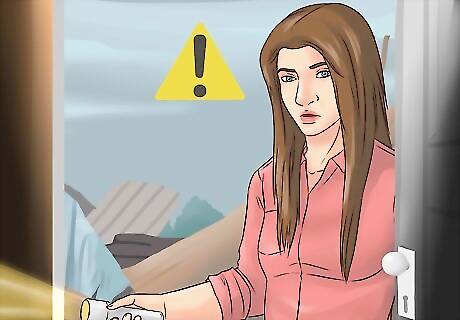
Create a compelling main character. Your horror story will be much stronger if you have a main character that seems unique and compelling. Your main character should also be flawed and have a distinct personality on the page. Having a compelling main character will keep your reader engaged. Your main character may have an internal flaw, like a struggle with self-esteem or jealousy around others. The character may also have difficulty with an external flaw, like a physical ailment or a physical trait they find unattractive. For example, your main character may be a young girl who is struggling with puberty. She may struggle to make friends in high school and relate to other girls her age because she is seen as a freak or a weirdo. She may have a preference for disturbing stories of the insane and the mad.

Determine the psychological element of your story. Your story should focus on horror that is psychological, rather than gory or bloody. Though there can still be blood in your horror story, of course. You may include psychological elements like madness, mania, mental illness, or a personal life crisis that leads to a psychic break. You may then gift your main character with one of these psychological elements and write about their experiences dealing with a disturbed psyche. For example, perhaps your main character is triggered by an intense moment with a bully at school. She may then start to lose her sense of reality. She may make choices or decisions that she would not make otherwise if she were not in a disturbed state of mind.

Read examples of psychological horror. To get a better sense of the genre, you may read popular examples of psychological horror. You may look for these texts online or at your local library. You may read several examples, including: House of Leaves by Mark Z. Danielewski. We Have Always Lived in the Castle by Shirley Jackson. It by Stephen King. The Yellow Wallpaper by Charlotte Perkins Gilman. Rebecca by Daphne du Maurier.
Drafting
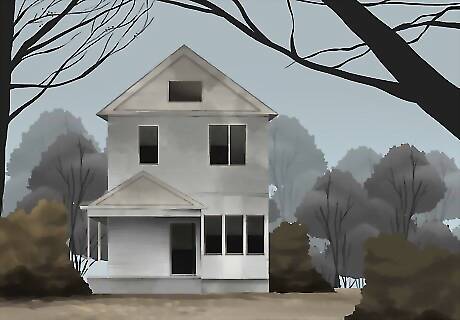
Create a mood of terror and foreboding. Psychological horror focuses more on the inner workings of your main character rather than external forces like a monster or creature in the woods. To keep your story engaging, you should try to create an unsettling atmosphere or mood. Add elements to your story that create a sense of foreboding, where the reader feels something bad or twisted is waiting just around the corner. You can create a terrifying atmosphere by including details that feel slightly off or unsettling to the reader. Twist what seems normal into something disturbing and surreal. Add a dash of horror to even the most everyday experiences and events. For example, you may add a strange twist to your main character’s day at high school where her experiences seem a little unsettling or off. Maybe she opens her locker to find a pile of someone else’s hair or perhaps she looks out the window in class to see a girl who looks just like her across the street.

Let bad things happen to your characters. A big element in horror stories is that bad things happen to good people, often over and over again. You should be willing to let bad or evil things happen to your characters, especially your main character, in your story. This will add to the stakes of the story and make the reader sympathize with your main character. You may try to set up your character to experience terror or horror in their life in degrees, starting with a small thing that goes bad and working up to a larger thing that goes terribly wrong. You may also have other characters around your main character experience bad things, creating a general sense of drama in your story. For example, you may have a main character who makes poor decisions due to her disturbed state of mind. She may become violent or lash out at others, leading to bad things happening to those closest to her.
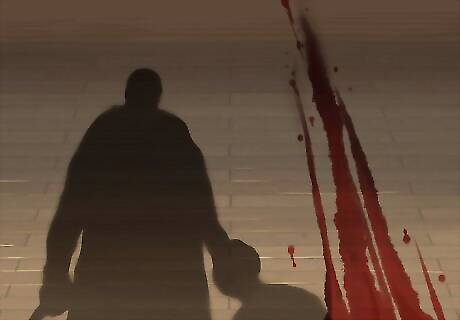
Include sensory details. You should do your best to avoid cliches in your writing and come up with unique details and descriptions. One way to do this is to focus on the five senses in every scene or moment of your story, describing how something feels, sounds, tastes, smells and looks to your characters. Using sensory details in your writing can also make the more disturbing moments of your psychological horror story come alive and feel real to your reader. For example, you may describe a character’s experience of a manic episode as “feeling like the world was split in two and I was on the side of darkness and confusion.” You may also try to describe the way blood smells or tastes, rather than lean on familiar descriptions of blood as “crimson red” or “scarlet.” You may describe blood as “bitter and metallic” or “wet, red rivets that pooled around my sneakers.”
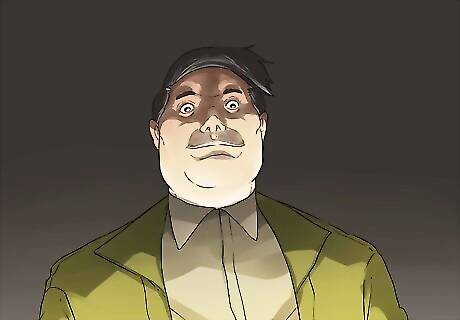
Avoid common horror cliches. You should try to avoid falling into common cliches as you write, especially when you are writing horror. Psychological horror is full of common cliches, or situations that have become so familiar they lose all meaning. A house that is alive, a woman on the verge of a nervous breakdown, or a family with a deep, dark secret in the attic are all familiar storylines in horror that have been done before. You should try to avoid cliche scenarios and descriptions, striving instead for a story that feels specific and unique to your point of view. One way to avoid these cliches is to take a situation that is familiar and make it personal to you and your perspective as a writer. Maybe you add a twist to a cliche storyline, such as a family with a deep, dark secret that is revealed at the very beginning of the story, leaving the characters to deal with the aftermath in the present. Or perhaps you make your "woman on the verge of a nervous breakdown" specific to your experience of anxiety or a friend's experience of trauma so the story feels more specific and nuanced.
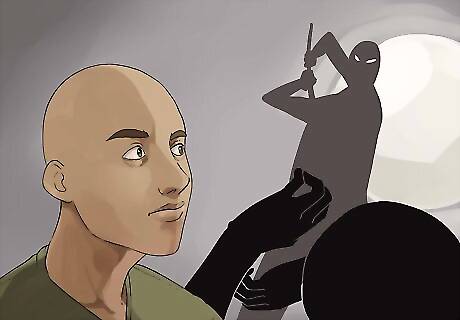
Build up to an unsettling ending. Your horror story should include an ending that feels disturbing or slightly off. You may include a twist in your ending or build up to an intense image that leaves the reader unsettled. Having a strong, disturbing ending can leave your reader perfectly creeped out, an ideal landing point for your horror story. You may decide to make a plot outline for your story to help you build up to a disturbing ending. You can use a plot diagram or the snowflake method to create the plot outline. For example, you may have a main character who does not realize she had a psychic break until the very end of the story. The big, unsettling twist may be that your main character finally realizes that all of her visions were made up in her head.
Polishing

Read your first draft out loud. Once you have a first draft, you should polish it so it becomes stronger. Read your first draft out loud from beginning to end. Listen to how each sentence flows into one another. Notice if there are certain passages that are confusing or unclear. Pay attention to any moments in the story that feels disturbing to you. You may underline or mark any sections that need to be reworked or revised. You may also highlight any sentences that seem to work for you, as you can then try to figure out how other areas can work just as well.

Share your first draft with others. You should find one or two sympathetic readers to look over your first draft. You may read the story out loud to them or give them a copy that they can then read on their own. You may then ask your readers for feedback on your story. Be willing to accept constructive feedback from others. Getting your story critiqued by attentive readers can make it that much stronger.

Revise your draft. Once you have received feedback on your story, you should take the time to revise it. You may work sentence by sentence or work on passages that need the most work first, followed by passages that need a medium or minimal amount of revising. Once you have revised your story, you may show it to your readers again to determine if you are that much closer to a finished draft.


















Comments
0 comment